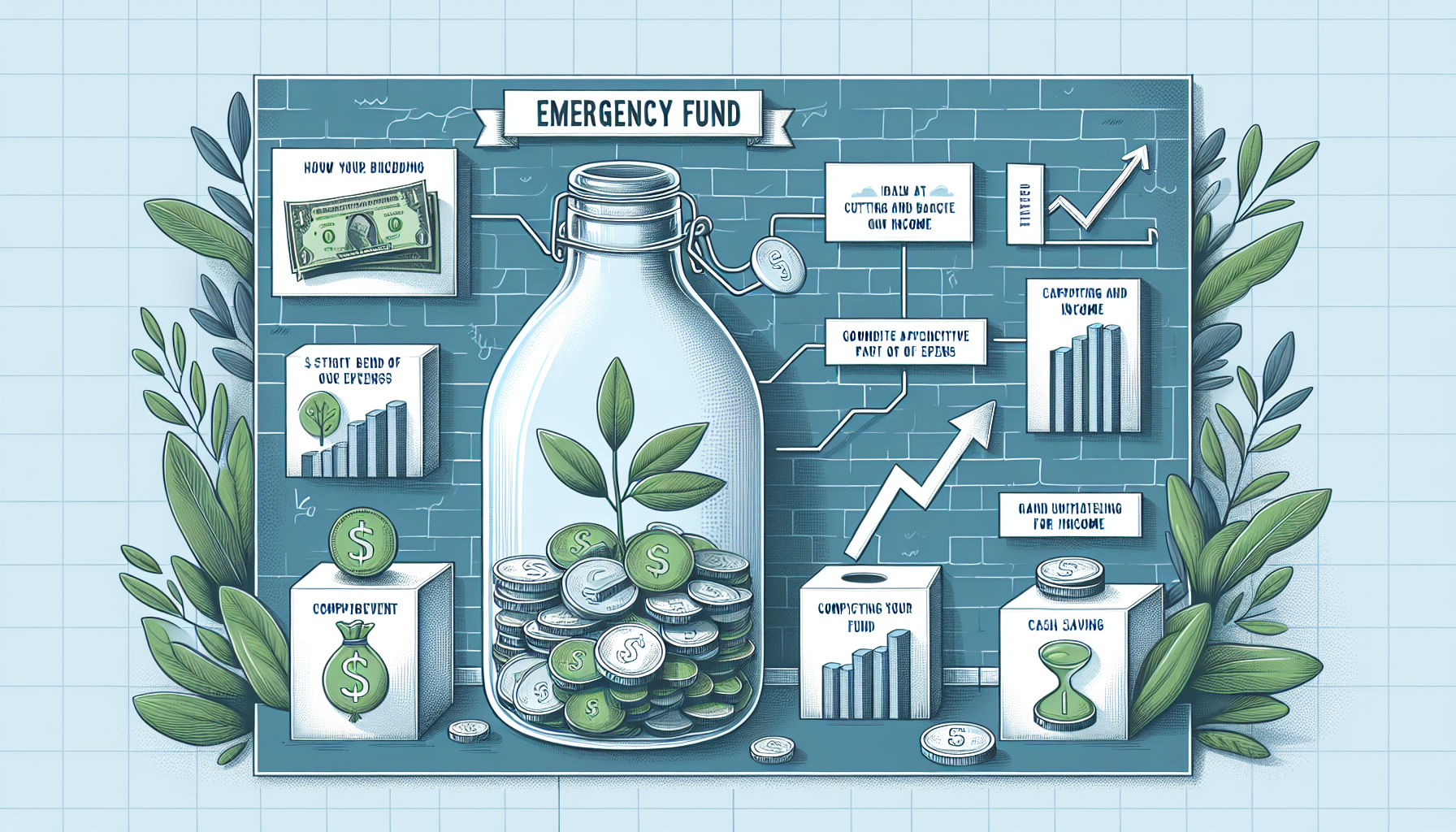Uncategorized
Building Your Emergency Fund: A Lifeline for Financial Peace of Mind

In today’s uncertain financial landscape, having an emergency fund is an absolute necessity. Whether you’re navigating unexpected expenses or dealing with job loss, an emergency fund can be your financial lifeline. In this article, we dive deep into the importance of having an emergency fund and provide actionable steps to start building one, regardless of your current financial situation.
What is an Emergency Fund and Why Do You Need One?
An emergency fund is a savings reserve set aside to cover unforeseen expenses such as medical emergencies, car repairs, or sudden job loss. It acts as a financial cushion, preventing you from accumulating debt or derailing your financial goals. The peace of mind provided by having a safety net cannot be overstated.
How Much Should You Save in Your Emergency Fund?
The recommended size of an emergency fund varies, but a common guideline is to aim for three to six months’ worth of living expenses. This amount can cover your basic needs if you’re unable to earn an income. Consider your personal situation, such as job stability and household size, to determine an appropriate amount for your fund.
Steps to Building Your Emergency Fund
Building an emergency fund might seem daunting, but by breaking it into manageable steps, you can steadily increase your savings:
- ✅ Set a Savings Goal: Determine your target amount based on your monthly expenses.
- ✅ Create a Budget: Review your monthly income and expenses to find room for savings.
- ✅ Start Small but Steady: Begin with small, consistent contributions to your fund.
- ✅ Automate Your Savings: Set up automatic transfers to your savings account to ensure regular contributions.
- ✅ Boost Your Income: Look for ways to increase earnings, like side gigs, to accelerate your savings.
- ✅ Cut Unnecessary Expenses: Identify discretionary spending you can reduce without sacrificing quality of life.
Where to Keep Your Emergency Fund
It’s crucial to keep your emergency fund accessible, yet separate from your everyday spending money. Consider a high-yield savings account, a money market account, or a no-penalty certificate of deposit (CD) for your savings.
Common Myths About Emergency Funds
Let’s dispel some myths surrounding emergency funds. First, some believe they don’t need an emergency fund if they have a credit card. Relying on credit can lead to significant debt. Others think they can’t save due to their income level, but even small contributions add up over time.
FAQ
Here are answers to some frequently asked questions about emergency funds:
- ❓ How quickly should I build my emergency fund? Aim to build it as quickly as possible, but don’t stress if it takes time. Consistency is key.
- ❓ Can I use my emergency fund for planned expenses? Ideally, reserved funds should only cover unplanned, essential expenses.
- ❓ Should I adjust my emergency fund over time? Review your fund periodically to ensure it aligns with your current lifestyle and expenses.
💸 Ready to secure your financial future by building an emergency fund? Start today, and provide yourself with a safety net that offers security and peace of mind.
Uncategorized
Mastering Financial Literacy: Empower Your Future Today!

Mastering Financial Literacy: Empower Your Future Today!
Financial literacy is more than just understanding numbers — it’s about making informed decisions that manifest in a secure and prosperous future. Whether you’re grappling with debt, learning how to budget effectively, or seeking ways to invest wisely, this guide is designed to empower you every step of the way.
Understanding Financial Literacy
Financial literacy encompasses the skills and knowledge that allow you to make informed and effective money-management decisions. It’s critical in developing responsible money habits and achieving financial independence.
Why Financial Literacy Matters
- Improves your ability to manage financial resources effectively for lifetime security.
- Enables informed financial decision-making.
- Enhances your ability to budget, save, and invest wisely.
Building a Budget That Works
Creating a budget is the cornerstone of financial stability. Follow these actionable steps to craft a budget that aligns with your goals and lifestyle:
Steps to Effective Budgeting
- Assess Your Income and Expenses: List all your income sources and monthly expenses. Be thorough!
- Set Clear Goals: Establish short-term and long-term financial goals. This will guide your budget priorities.
- Create a Plan: Allocate funds to each expense category, ensuring essential costs are covered first.
- Monitor and Adjust: Regularly review your budget and make adjustments as needed to meet your goals.
Strategies to Effectively Manage Debt
Debt can be a significant hurdle to financial freedom. Implement these strategies to manage and eliminate debt effectively:
Debt Reduction Techniques
- Debt Snowball Method: Pay off smallest debts first to build momentum.
- Debt Avalanche Method: Tackle high-interest debts first to minimize cost over time.
- Consider Consolidation: Streamline payments with a debt consolidation loan if it reduces interest rates and costs.
Investing for Long-term Wealth
Investing is a powerful tool for building wealth over time. Start early and consider these smart strategies:
Investment Tips
- Diversify Your Portfolio: Spread investments across different asset types to mitigate risk.
- Contribute Regularly: Set up automatic contributions to investment accounts.
- Educate Yourself: Continuously learn about markets and instruments to refine your strategy.
FAQs on Financial Literacy
- What is financial literacy and why is it important? Financial literacy involves understanding and using various financial skills effectively. It’s crucial for making sound financial decisions and achieving independence.
- How can I start learning about personal finance? Begin by reading articles, books, and taking online courses focused on budgeting, saving, and investing.
- What are some basic investing tips for beginners? Start with setting clear goals, learning about different investment vehicles, and considering working with a financial advisor if needed.
Mastering financial literacy is a journey. By applying these principles, you’ll not only gain control over your finances but also pave the path to a more secure and prosperous future. 💸
Uncategorized
SEO-optimized title that sparks curiosity and delivers value

Write a well-structured blog article of up to 5000 words, fully optimized for SEO. The content should be geared toward readers who want to improve their financial life — whether they’re paying off debt, learning how to budget, saving for the future, or exploring smart ways to invest and protect their income.
Focus on practical advice, responsible money habits, and easy-to-follow strategies that help people build lasting financial stability, regardless of their current income or experience.
⚙️ Apply SEO techniques:
Use
and
subheadings with the main keyword and natural variations
Include checkmark ✅ or bullet lists where helpful
End with a FAQ block answering real and common questions on the topic
Use emojis 💸📊🏡 where appropriate to keep the tone friendly and relatable
Make sure the article is accurate, up-to-date, and formatted in clean HTML. Maintain a clear, accessible, and empowering tone. Deliver content with authenticity, financial responsibility, and encouragement. Help the reader take control of their money, build confidence, and make informed decisions that support their future.
Uncategorized
Unlock Financial Success: Essential Personal Budgeting Strategies You Need to Know

Write a well-structured blog article of up to 5000 words, fully optimized for SEO. The content should be geared toward readers who want to improve their financial life — whether they’re paying off debt, learning how to budget, saving for the future, or exploring smart ways to invest and protect their income.
Focus on practical advice, responsible money habits, and easy-to-follow strategies that help people build lasting financial stability, regardless of their current income or experience.
⚙️ Apply SEO techniques:
Use
and
subheadings with the main keyword and natural variations
Include checkmark ✅ or bullet lists where helpful
End with a FAQ block answering real and common questions on the topic
Use emojis 💸📊🏡 where appropriate to keep the tone friendly and relatable
Make sure the article is accurate, up-to-date, and formatted in clean HTML. Maintain a clear, accessible, and empowering tone. Deliver content with authenticity, financial responsibility, and encouragement. Help the reader take control of their money, build confidence, and make informed decisions that support their future.
-

 Fashion8 anos ago
Fashion8 anos agoThese ’90s fashion trends are making a comeback in 2017
-

 Entertainment8 anos ago
Entertainment8 anos agoThe final 6 ‘Game of Thrones’ episodes might feel like a full season
-

 Fashion8 anos ago
Fashion8 anos agoAccording to Dior Couture, this taboo fashion accessory is back
-

 Entertainment8 anos ago
Entertainment8 anos agoThe old and New Edition cast comes together to perform
-

 Sports8 anos ago
Sports8 anos agoPhillies’ Aaron Altherr makes mind-boggling barehanded play
-

 Business8 anos ago
Business8 anos agoUber and Lyft are finally available in all of New York State
-

 Entertainment8 anos ago
Entertainment8 anos agoDisney’s live-action Aladdin finally finds its stars
-

 Sports8 anos ago
Sports8 anos agoSteph Curry finally got the contract he deserves from the Warriors


